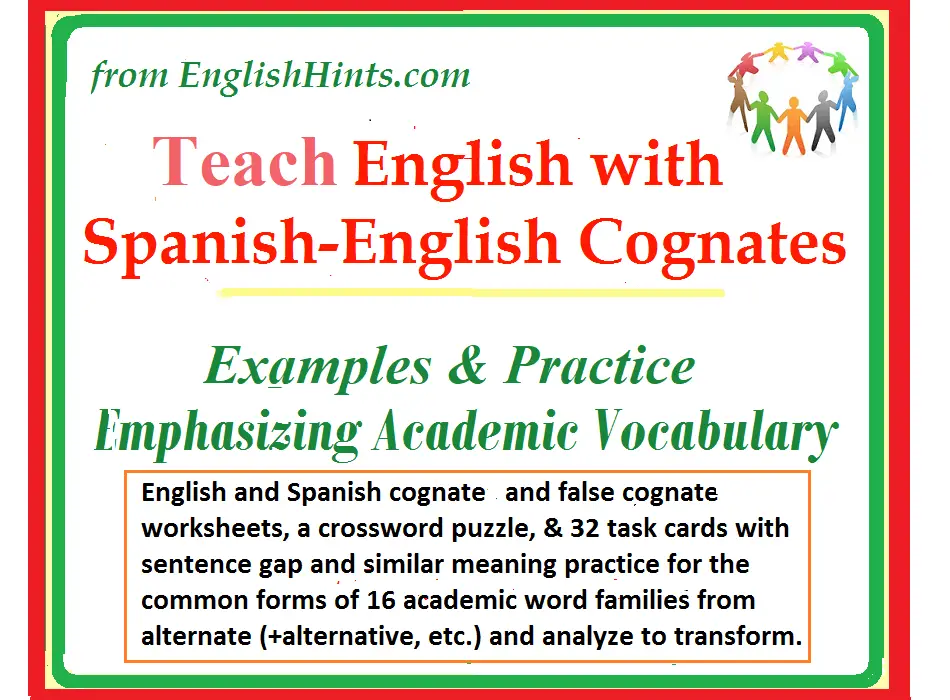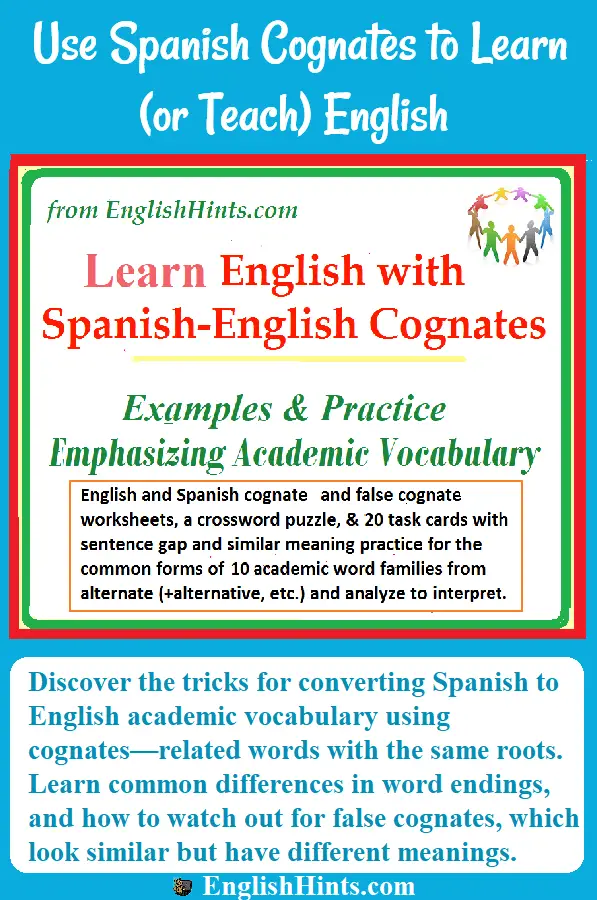Use Spanish Cognates to Learn (or Teach) English
Spanish cognates can help Spanish-speakers learn a great deal of English vocabulary. You just need to know a few simple rules for converting from Spanish to English or back.
For example, many English verbs ending in -ate are very similar in form to -AR verbs in Spanish. They usually have similar meanings as well, and their noun forms are also close:
- concentrate/concentration- concentrar/concentración
- eliminate/elimination- eliminar/eliminación
Other verbs ending -ificar in Spanish change to -ify in English. (Clarificar, identificar, justificar, notificar, or verificar change to clarify, justify, verify, etc.) Their nouns follow the same pattern as the first verbs above (clarification, etc.)
If you speak Spanish and know some basic English, spend a little time studying these patterns. It can make a big difference in your English vocabulary and confidence.
The packets below can help you make the connections quickly. You'll also avoid the worst pitfalls of false cognates. (They are words that appear similar but actually mean very different things.)
The packets all share most of the same course material. The first is for self-study by Spanish speakers learning English. The second packet is for teachers to use with their students.
You will need Adobe or another pdf reader to read these pdfs. If you do not have Adobe Reader you can download it, free, here.
Note: As of late Jan. 2024, I will no longer be selling these packets directly from my site, but almost all the classroom packets are available on my store on Teachers Pay Teachers. Until I can finish linking to each packet individually, you can find them at my main store page on TPT. I will make the Learn English with Cognates packet available as soon as possible.
Learn English with Spanish-English Cognates
Most of this pdf is various types of practice. It contains worksheets to complete (selecting word forms or words to fit into sentences, etc.). It also has a crossword puzzle.
Task cards give in-depth practice with important academic vocabulary. Each word family gets two cards.
The first gives the various parts of speech for the 'family.' An example: analyze (vb.), analyst (n.- person), analysis (n.), analytical (or analytic: adjs.), & analytically (adv.)
That card also has several sentences with a space to fill in the correct form (analyze, analysis, etc.)
The second card gives an example sentence using one of these forms. You need to decide which of the following sentences have the same meaning as the example. It's a game: how many can you get right?
Contents:
- Introduction to English-Spanish Cognates for Spanish: page 3
- AR to –ate Verb Cognates: 4
- Other Latin Roots Creating English-Spanish Cognates: 5-7
- Answers for pages 3-7: 8-9
- More Practice with English Cognates: 10-11; Answers 12-13
- False Cognates: 14-15; Practice:16; Answers: 17
Main English Practice:
- How to Use the Task Cards: 18
- How to Pronounce Task Card Vocabulary: 19-20
- Task Cards (1-20; 2 per academic word/ word family)- pages 21-25
- Task Card Answers 26-30
- Academic Vocabulary: Cognates Crossword Puzzle: pg. 31 (or 33 to print if you want)
- Crossword Answers: 32 (or 34- long version to print.)
- Cognate Review (or Quiz): 35-36
- Cognate Review/Quiz Answers: 37-38
- Acknowledgments
Available soon (see note above.) Learn English with Spanish-English Cognates packet for $7.00.
Teach English with Spanish-English Cognates

According to research, English Language Learners need help learning to recognize and work with cognates.
Both Spanish and a majority of English academic vocabulary are Latin-based. So, learning a few cognate rules gives Spanish-speaking students a huge head start on English academic vocabulary (CALP).
These task cards, worksheets, and games introduce English academic words that have clear Spanish cognates.
By practicing with them, students will learn to recognize common patterns in the differences between the English and Spanish words.
The patterns they learn will transfer, helping them recognize many more words.
Students need to recognize not only similarities in word meanings. They also need to notice when apparent similarities mask differences in connotation or meaning.
This packet has a worksheet on false cognates. It asks students to verify meanings with a dictionary. They should learn not to rely too much on seeming-similarity when figuring out the meaning of a word.
The packet includes two task cards for each of 16 important academic word ‘families.’ The first card gives the most common forms of each word. (That's most often verb, noun, adjective, & sometimes adverb forms. An example: conclude, conclusion, conclusive, conclusively.) Then students practice choosing the correct form to complete each of several sentences.
The second card gives one more example of a sentence using one of the forms. Then it provides four somewhat similar sentences without the target word. It asks students to determine which ones have the same meaning.
By practicing with both kinds of cards, students get to see multiple examples of each word’s use. They should become familiar with the common suffixes like –tion, -able, -ed, -ive, and –ly. They'll see the ways they correspond with Spanish suffixes (-ción, -sión, -able—pronounced differently-- -ado, -ido, -ivo, -mente, etc.). They'll also learn where words with those (English) endings fit into sentences.
There is also a page teaching the English stress and pronunciation of each word form. It's designed for teachers to go over with the class. That way students can hear and repeat the correct forms and notice the changes in stress as verbs convert to nouns or adjectives.
The revised packet includes extra practice with more cognates. It's on sale for a limited time at $9.50.
Contents:
- Notes for Teachers: cognates, the worksheets, task cards, & pronunciation- pages 3-5
- Bingo for extra practice & links to cognate research & task card uses & games- 6
- Sample vocabulary notebook page template- 7
- Introduction to Spanish-English Cognates- 8
- Other Latin Roots Creating Spanish-English Cognates- 9-10
- More Practice with English Cognates- 11
- False Cognates & Practice with False (or Partially False) Cognates- 12-13
- Pronouncing Task Card Vocabulary handout- 14
- Academic Vocabulary: Cognates Crossword- 15
- Task Cards (1-32; 2 per academic word/ word family)- 16-23
- 5 page Task Card Answer key- 24-28
- Cognate Review (or Quiz)- 29
Teacher Answer Sheets (moved to the bottom so the pages to print will be together in the middle)
- Cognate Review/Quiz Answer key- page 30
- Introduction and Root Answer key- 31
- More Practice with Cognates Answer key- 32
- Answer key for False Cognates (pg. 13)- 33
- Crossword (page 15) Answer key- 34
- Credits & similar packets- 35-36
See Reviews from Other Teachers
You can see reviews of this packet by other teachers in the EnglishHints store on Teachers Pay Teachers. It's also available for purchase there for $9.50. Show your English learners they know more English than they think they do!

